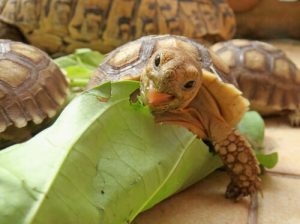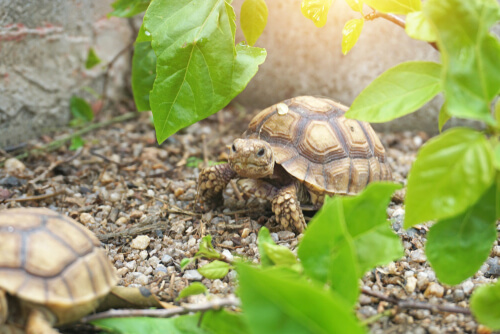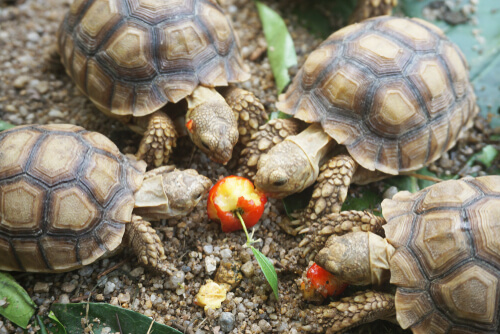What to Feed African Tortoises

For many owners, knowing what to feed African tortoises can be a bit of a challenging because they require a special diet. This vulnerable species has a very restricted diet and is prone to catching several diseases.
Luckily, they don’t need exotic foods to be healthy in their environment. It’s really very easy to feed African tortoises. Most of the food that they eat can be found outside. Also, you can add other things to it to make it even tastier.
African Tortoises
The African Spurred Tortoise is originally from North-Central Africa and the word “spurred” comes from their powerful front legs. They’re a large breed, although not as big as the Galápagos tortoise or the Aldabra giant tortoise.
The longevity of these tortoises is quite impressive, approximately 40 to 70 years. Amazingly, they are estimated to live even longer. These reptiles make great pets in most parts of the world, but they need a warm climate to survive and a lot of sunlight throughout the year.
Their natural habits are currently threatened by urbanization. As a result, they’re now globally classified as a vulnerable species and the only way to have one at home is from a professional breeder.
As for feeding African tortoises, it’s quite peculiar because their diet doesn’t include either animal protein or any type of fruit. Their diet should consist of elements that are nearby, which is mainly grass, hay, and a variety of greens.

What to Feed African Tortoises
Calcium is really important for an African tortoise’s diet, especially for the formation of their shell, which is prone to deformities if they don’t eat properly. Calcium also helps them absorb solar rays that are used to produce vitamin D. This vitamin is essential for their entire body.
Most of what they eat every day should consist of a variety of flowers, grass, and hay. Flowers can include dandelion, clovers, wildflowers, etc.
If your tortoise is kept in an open space, there should be no problem in getting what they need. On the other hand, if your tortoise is kept in a closed area, like an apartment, you’ll need to supplement their diet with a variety of common green leaves.
By doing so, you’ll need to be careful to not cause them any harm. Tortoises, just like humans, are prone to developing addictions to what they eat. Therefore, feeding them fruit isn’t a good idea because they find them very tasty.
Some of the most common fruits that people feed African Tortoises are cucumbers, tomatoes, figs, apples, and pears. Whilst you can feed them these fruits, the nutrients they contain aren’t enough and this can cause health problems which you may only notice once it’s too late.
Try to avoid feeding them any type of meat to prevent deformities, especially because their digestive system isn’t designed for it. They’re herbivores after all.

Overall Diet
Their diet should consist mainly of wild grasses and, if you want, a small amount of fruit to make their diet a little tastier. A good recommend amount would be 90% grass and flowers, and 10% fruit.
You can put a lot of food out for them every day because they have slow metabolisms. Alternatively, you can feed them small portions throughout the day.
African tortoises can go for at least one week without consuming water because they can survive in the arid lands of Africa.
It’s a good idea to add some calcium supplements to prevent them from developing a calcium deficiency. Likewise, don’t give them too much because it could cause shell deformities.
If you’re worried about what to feed African Tortoises, it’s really simple. They just need a large space like a garden and they’ll take care of themselves.
Remember to watch their calcium intake and give them a small amount of fruit so they can enjoy their meals.
[featured-post url=”https://myanimals.com/longest-living-animals-in-the-world/”
For many owners, knowing what to feed African tortoises can be a bit of a challenging because they require a special diet. This vulnerable species has a very restricted diet and is prone to catching several diseases.
Luckily, they don’t need exotic foods to be healthy in their environment. It’s really very easy to feed African tortoises. Most of the food that they eat can be found outside. Also, you can add other things to it to make it even tastier.
African Tortoises
The African Spurred Tortoise is originally from North-Central Africa and the word “spurred” comes from their powerful front legs. They’re a large breed, although not as big as the Galápagos tortoise or the Aldabra giant tortoise.
The longevity of these tortoises is quite impressive, approximately 40 to 70 years. Amazingly, they are estimated to live even longer. These reptiles make great pets in most parts of the world, but they need a warm climate to survive and a lot of sunlight throughout the year.
Their natural habits are currently threatened by urbanization. As a result, they’re now globally classified as a vulnerable species and the only way to have one at home is from a professional breeder.
As for feeding African tortoises, it’s quite peculiar because their diet doesn’t include either animal protein or any type of fruit. Their diet should consist of elements that are nearby, which is mainly grass, hay, and a variety of greens.

What to Feed African Tortoises
Calcium is really important for an African tortoise’s diet, especially for the formation of their shell, which is prone to deformities if they don’t eat properly. Calcium also helps them absorb solar rays that are used to produce vitamin D. This vitamin is essential for their entire body.
Most of what they eat every day should consist of a variety of flowers, grass, and hay. Flowers can include dandelion, clovers, wildflowers, etc.
If your tortoise is kept in an open space, there should be no problem in getting what they need. On the other hand, if your tortoise is kept in a closed area, like an apartment, you’ll need to supplement their diet with a variety of common green leaves.
By doing so, you’ll need to be careful to not cause them any harm. Tortoises, just like humans, are prone to developing addictions to what they eat. Therefore, feeding them fruit isn’t a good idea because they find them very tasty.
Some of the most common fruits that people feed African Tortoises are cucumbers, tomatoes, figs, apples, and pears. Whilst you can feed them these fruits, the nutrients they contain aren’t enough and this can cause health problems which you may only notice once it’s too late.
Try to avoid feeding them any type of meat to prevent deformities, especially because their digestive system isn’t designed for it. They’re herbivores after all.

Overall Diet
Their diet should consist mainly of wild grasses and, if you want, a small amount of fruit to make their diet a little tastier. A good recommend amount would be 90% grass and flowers, and 10% fruit.
You can put a lot of food out for them every day because they have slow metabolisms. Alternatively, you can feed them small portions throughout the day.
African tortoises can go for at least one week without consuming water because they can survive in the arid lands of Africa.
It’s a good idea to add some calcium supplements to prevent them from developing a calcium deficiency. Likewise, don’t give them too much because it could cause shell deformities.
If you’re worried about what to feed African Tortoises, it’s really simple. They just need a large space like a garden and they’ll take care of themselves.
Remember to watch their calcium intake and give them a small amount of fruit so they can enjoy their meals.
[featured-post url=”https://myanimals.com/longest-living-animals-in-the-world/”
All cited sources were thoroughly reviewed by our team to ensure their quality, reliability, currency, and validity. The bibliography of this article was considered reliable and of academic or scientific accuracy.
- Petrozzi, F., Hema, E.M., Demaya, G.S., Benansio, J.S., Eniang, E.A., Diagne, T., Segniagbeto, G.H., and Luiselli, L. 2020. Centrochelys sulcata (Miller 1779) – African Spurred Tortoise, Grooved Tortoise, Sahel Tortoise, Tortue Sillonnée. In: Rhodin, A.G.J., Iverson, J.B., van Dijk, P.P., Stanford, C.B., Goode, E.V., Buhlmann, K.A., and Mittermeier, R.A. (Eds.). Conservation Biology of Freshwater Turtles and Tortoises: A Compilation Project of the IUCN/SSC Tortoise and Freshwater Turtle Specialist Group. Chelonian Research Monographs 5(14):110.1–16. doi: 10.3854/crm.5.110.sulcata.v1.2020; www.iucn-tftsg.org/cbftt/.
This text is provided for informational purposes only and does not replace consultation with a professional. If in doubt, consult your specialist.








